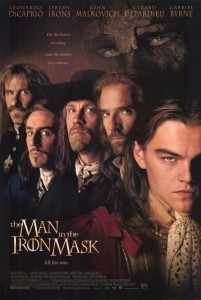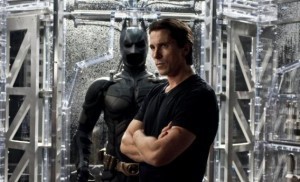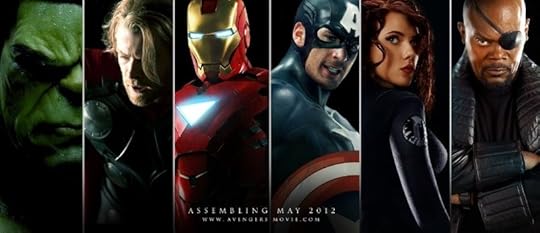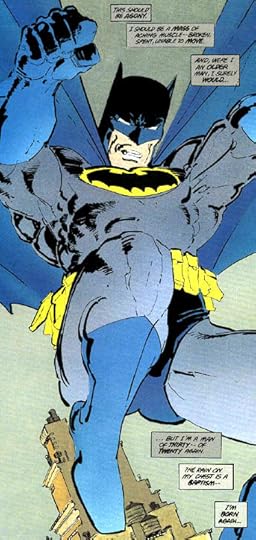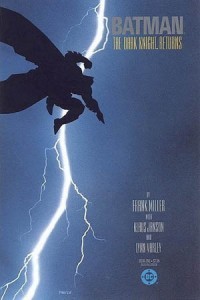Randall Allen Dunn's Blog: Packing Action, page 14
March 26, 2013
MUSIC/MUSICAL: Modern Love – Revisiting the Church
I know when to go out
I know when to stay in
Get things done
In our church service last week, a repeating piano-and-guitar riff reminded me of David Bowie’s 1983 song, “Modern Love”. I loved that song, but I later determined it was a message against the church. (That may or may not be true, since many people have come up with conflicting interpretations, but that’s my own interpretation.) It seemed to view the church as unnecessary, intrusive and controlling, pretending to care about people so it can recruit and manipulate them.
N ever gonna fall for
ever gonna fall for
Modern love – walks beside me
Modern love – walks on by
Modern love – gets me to the church on time
Church on time – terrifies me
Church on time – makes me party
Church on time – puts my trust in god and man
God and man – no confessions
God and man – no religion
God and man – don’t believe in modern love
While I don’t agree with that message, I can certainly understand the caution and skepticism some people feel toward the church. After all, the church has not always acted like the church. That is, as the representation of Jesus Christ on Earth.
Jesus accepted prostitutes, corrupt tax collectors and outcast lepers. I f Jesus was on Earth today, he would accept the homosexuals, drug dealers, drunk drivers, child molesters, while collar crooks, dirty politicians and every other kind of sinner. He would not turn a blind eye toward their sin, any more than he turns a blind eye toward the sins of the church. But he would not turn away anyone seeking love and acceptance.
f Jesus was on Earth today, he would accept the homosexuals, drug dealers, drunk drivers, child molesters, while collar crooks, dirty politicians and every other kind of sinner. He would not turn a blind eye toward their sin, any more than he turns a blind eye toward the sins of the church. But he would not turn away anyone seeking love and acceptance.
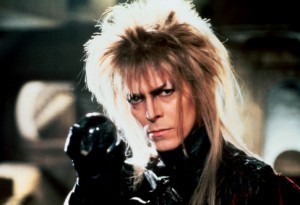 Unfortunately, many people in today’s church still struggle to accept those who engage in music, clothes, hairstyles or activities that they consider strange or somehow “wrong”. As if a different style means a different internal value system and therefore leads to sin. I’m not referring to activities the Bible clearly describes as sinful, such as feeding lust through pornography or feeding greed by cheating on taxes. I’m talking about whether it’s acceptable for a person to dye their hair blue, pierce their navel, listen to rap music or even watch a scary movie, and still be welcome in the church. That might not be a style choice you or I would make, but it’s certainly not an issue of sin.
Unfortunately, many people in today’s church still struggle to accept those who engage in music, clothes, hairstyles or activities that they consider strange or somehow “wrong”. As if a different style means a different internal value system and therefore leads to sin. I’m not referring to activities the Bible clearly describes as sinful, such as feeding lust through pornography or feeding greed by cheating on taxes. I’m talking about whether it’s acceptable for a person to dye their hair blue, pierce their navel, listen to rap music or even watch a scary movie, and still be welcome in the church. That might not be a style choice you or I would make, but it’s certainly not an issue of sin. 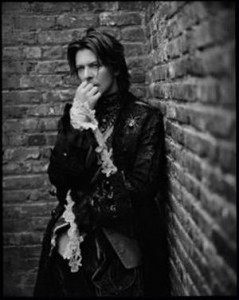 If the church can’t learn to accept people with different styles, how can they ever learn to accept and love people who are, in fact, living lives of sin?
If the church can’t learn to accept people with different styles, how can they ever learn to accept and love people who are, in fact, living lives of sin?
I catch a paper boy
But things don’t really change
I’m standing in the wind
But I never wave bye-bye
But I try, I try
There’s no sign of life
It’s just the power to charm
I’m lying in the rain
But I never wave bye-bye
But I try, I try The Bible tells us Jesus died for us while we were still sinners, and that his kindness leads us to repentance. It also tells us God did not send Jesus to be our judge, but to be our savior. Criticism and judgment will not turn anyone from their sin. It is only through kindness and acceptance that people come to know Christ and find healing.
The Bible tells us Jesus died for us while we were still sinners, and that his kindness leads us to repentance. It also tells us God did not send Jesus to be our judge, but to be our savior. Criticism and judgment will not turn anyone from their sin. It is only through kindness and acceptance that people come to know Christ and find healing.
Thankfully, most people who are sincerely devoted to Christ recognize this. Despite their natural human tendencies to avoid people who act differently than they do, they can learn to overcome those thoughts and feelings. To love people that the rest of the world rejects, since they know they’ve been forgiven of their own sins and accepted by God, in spite of the terrible people they once were.
The apostle Paul spoke to the church about their different backgrounds – different styles and former lives of sin – in Ephesian 2. He explained that those of Jewish background, chosen by God from ancient times, and those of Gentile background who were “outsiders”, were now given equal access to God through the sacrifice of Christ. He stated that through Christ’s death and resurrection, God made one new man out of the two, so that by accepting Christ, all people – Jew or Gentile, churched or unchurched – could approach God without restriction.
 This Easter, I hope you can give people a second chance.
This Easter, I hope you can give people a second chance.
If you’re part of the church, learn to see beyond the lifestyle choices and even the sins of people who are looking for hope and wondering if the church still offers any.
If you’re not part of the church, learn to see beyond the human failings of Christians when they don’t act in Christian love, and recognize that they also need forgiveness – even yours.
When we focus on what flawed humans have said or done in the past, we will naturally turn away from one another. Instead, focus on the example of Christ and learn to accept one another, just as Christ has accepted you.
Happy Easter!
Find more reviews of “Let’s Dance” at amazon.com!
February 28, 2013
MOVIE: The Man in the Iron Mask – Defending Your Honor
Honor.
It’s a word that is not used much in modern society. The concept itself has been somewhat forgotten, in the wake of self-indulgent leaders, corrupt politicians and superficial celebrities. The concept of honor – admiring someone for how well they adhere to a set of moral principles – is hard to grasp. Because it is often hard to find examples of it. Our society shines a spotlight on the rich and powerful, and we view them and long to attain the material wealth and influence they have obtained.
But we don’t necessarily want to become like them. That is, to think and act the way they do.
By focusing on what they have, rather than their inner character, 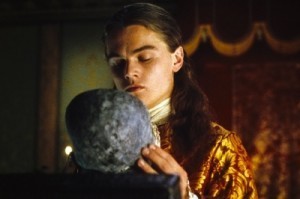 we become jealous and greedy for things that don’t really last over time, the way a good reputation will.
we become jealous and greedy for things that don’t really last over time, the way a good reputation will.
In the 1998 film, “The Man in the Iron Mask”, honor is displayed through the legendary musketeers, remembered for their bravery and self-sacrifice in protecting their king and country. But these heroes have long since retired, all except for D’Artagnan (Gabriel Byrne), now captain of the king’s musketeers. He insists on maintaining his duty to protect the new king, Louis XIV (Leonardo DiCaprio), in spite of the fact that Louis is a cruel, self-serving dictator who is forcing the country into poverty while he himself lives in luxury and beds a long procession of women. 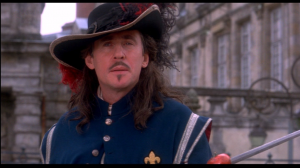 D’Artagnan hopes Louis will mature and learn to govern his people wisely, instead of continuing to act like a selfish child.
D’Artagnan hopes Louis will mature and learn to govern his people wisely, instead of continuing to act like a selfish child.
When Louis privately orders another former musketeer, Aramis (Jeremy Irons), to kill the general of the Jesuits threatening to overthrow him, Aramis agrees to do so. However, he cannot, since he himself is the Jesuit general. Instead, he arranges a secret meeting with the other musketeers, Porthos (Gérard Depardieu), Athos (John Malkovich), and D’Artagnan. 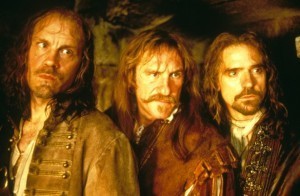 Aramis suggests they join together to overthrow their corrupt king, to free France of his tyranny. D’Artagnan refuses to partner with them in their plot, yet leaves the meeting before hearing any more. It would be right for him to expose their plot to Louis and have them all arrested. But he has no more desire to arrest his friends than to betray his king. He cannot fault them for wanting to protect the country, but he urges them to be patient and give the king more opportunity to change his ways.
Aramis suggests they join together to overthrow their corrupt king, to free France of his tyranny. D’Artagnan refuses to partner with them in their plot, yet leaves the meeting before hearing any more. It would be right for him to expose their plot to Louis and have them all arrested. But he has no more desire to arrest his friends than to betray his king. He cannot fault them for wanting to protect the country, but he urges them to be patient and give the king more opportunity to change his ways.
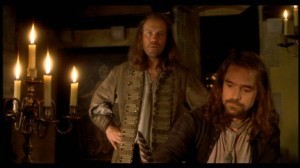 After D’Artagnan leaves, Aramis reveals that Louis has a twin brother, Philippe, who was kept hidden in order to prevent a war over the kingdom. Louis learned of his twin years ago and ordered Aramis himself to arrest Philippe and lock him in an iron mask to hide his identity before taking him to the Bastille prison. To this day, Aramis remains ashamed of agreeing to let an innocent young man suffer. But since Philippe is also of royal blood, Aramis has determined the only way to set things right is to replace Louis with Philippe.
After D’Artagnan leaves, Aramis reveals that Louis has a twin brother, Philippe, who was kept hidden in order to prevent a war over the kingdom. Louis learned of his twin years ago and ordered Aramis himself to arrest Philippe and lock him in an iron mask to hide his identity before taking him to the Bastille prison. To this day, Aramis remains ashamed of agreeing to let an innocent young man suffer. But since Philippe is also of royal blood, Aramis has determined the only way to set things right is to replace Louis with Philippe.
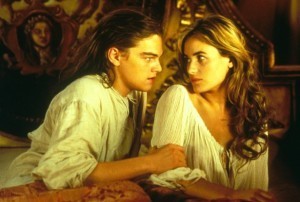 After some debate over the strength of Aramis’ plan, Athos and Porthos agree they have no better option. Athos wants revenge on the king for forcing his son, Raoul (Peter Sarsgaard), to be killed in battle by ordering him back into battle after his term of service ended and moving him to the front lines of battle without cause. The real reason was that Louis had taken an interest in Christine (Judith Godréche), Raoul’s fiancée. After having Raoul killed, Louis seduced Christine and made her his mistress.
After some debate over the strength of Aramis’ plan, Athos and Porthos agree they have no better option. Athos wants revenge on the king for forcing his son, Raoul (Peter Sarsgaard), to be killed in battle by ordering him back into battle after his term of service ended and moving him to the front lines of battle without cause. The real reason was that Louis had taken an interest in Christine (Judith Godréche), Raoul’s fiancée. After having Raoul killed, Louis seduced Christine and made her his mistress.
 After the musketeers free Philippe from prison and his mask, they explain to him who he is. Having been raised in a common house and then being sentenced to the dungeon for years, Philippe finds it hard to grasp that he is the king’s twin. He also wonders whether he can sacrifice a simple common life, with all its ordinary pleasures, to live in a palace and be responsible for the entire country. He understands why the musketeers want him to do it, but he’s not sure it’s what he wants to do with his own life.
After the musketeers free Philippe from prison and his mask, they explain to him who he is. Having been raised in a common house and then being sentenced to the dungeon for years, Philippe finds it hard to grasp that he is the king’s twin. He also wonders whether he can sacrifice a simple common life, with all its ordinary pleasures, to live in a palace and be responsible for the entire country. He understands why the musketeers want him to do it, but he’s not sure it’s what he wants to do with his own life.
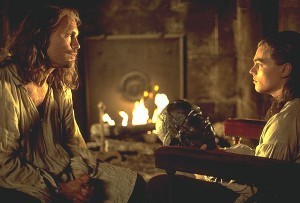 When he tells Athos, who has agreed to mentor him in his portrayal of the king, that he knows Athos wants to pursue the plan in order to avenge his son, Athos tells him that’s not the true reason. “Once, I – once, all of us – believed in serving something greater than ourselves,” Athos tells him. “Aramis had his faith, Porthos his lust for life, D’Artagnan his devotion. And I had Raoul. But we all had a common dream. That one day we would finally be able to serve a king who was worthy of the throne. It is what we dreamt, what we bled for, and what we have waited a lifetime to see. I taught Raoul to believe in that dream, and now my son is dead. And now I want to know if my son’s life was in vain. And the only person who can answer that is you.”
When he tells Athos, who has agreed to mentor him in his portrayal of the king, that he knows Athos wants to pursue the plan in order to avenge his son, Athos tells him that’s not the true reason. “Once, I – once, all of us – believed in serving something greater than ourselves,” Athos tells him. “Aramis had his faith, Porthos his lust for life, D’Artagnan his devotion. And I had Raoul. But we all had a common dream. That one day we would finally be able to serve a king who was worthy of the throne. It is what we dreamt, what we bled for, and what we have waited a lifetime to see. I taught Raoul to believe in that dream, and now my son is dead. And now I want to know if my son’s life was in vain. And the only person who can answer that is you.”
 Philippe considers this, and ultimately decides to proceed with their plan. Athos teaches him how to conduct himself as royalty, to show no concern for other people and to stop using polite manners, since everyone else is expected to defer to him instead. He continues to remind Philippe that, especially in the case of King Louis, he must think only of himself.
Philippe considers this, and ultimately decides to proceed with their plan. Athos teaches him how to conduct himself as royalty, to show no concern for other people and to stop using polite manners, since everyone else is expected to defer to him instead. He continues to remind Philippe that, especially in the case of King Louis, he must think only of himself.
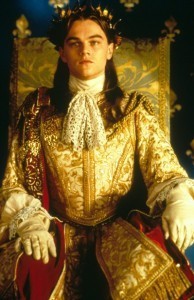 The musketeers steal into the palace during a royal ball and kidnap the king, sending Philippe in his place. Philippe accidentally gives himself away when one lady stumbles to the palace floor. Philippe hurries down from his throne to help her up, an act which shocks and confuses everyone at the party. Then Christine storms into the court and presents evidence that Louis had her fiancé, Raoul, murdered, and Philippe – acting as the king – promises to make amends to her, rather than having her executed, as Louis would have done. D’Artagnan senses something is wrong and urges “the king” to accompany him outside. He and his guards discover the musketeers escaping with King Louis. D’Artagnan recovers him, and the guards capture Philippe while the musketeers escape, forced to leave Philippe behind.
The musketeers steal into the palace during a royal ball and kidnap the king, sending Philippe in his place. Philippe accidentally gives himself away when one lady stumbles to the palace floor. Philippe hurries down from his throne to help her up, an act which shocks and confuses everyone at the party. Then Christine storms into the court and presents evidence that Louis had her fiancé, Raoul, murdered, and Philippe – acting as the king – promises to make amends to her, rather than having her executed, as Louis would have done. D’Artagnan senses something is wrong and urges “the king” to accompany him outside. He and his guards discover the musketeers escaping with King Louis. D’Artagnan recovers him, and the guards capture Philippe while the musketeers escape, forced to leave Philippe behind.
D’Artagnan then learns the truth that Philippe is Louis’ own brother, as Louis orders him to be returned to prison and to the iron mask. 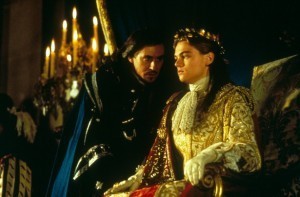 D’Artagnan then joins the musketeers in an effort to free Philippe from prison.
D’Artagnan then joins the musketeers in an effort to free Philippe from prison.
Louis and his guards corner D’Artagnan and the others at the Bastille prison, giving them no escape. Philippe offers to surrender himself so the musketeers can be spared, but D’Artagnan refuses. He confesses to a secret affair with Queen Anne (Anne Parillaud), explaining that he is the father of both Louis and Philippe, and he can’t bear to let either of them die. He had served Louis all these years as a father, not merely as a soldier. Philippe recognizes that all this time, D’Artagnan himself was the one forced to wear a mask.
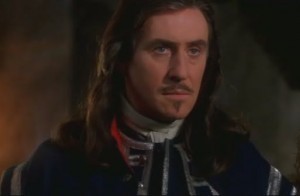 They all agree to face the kings’ guards together, and charge straight into the volley of gunfire. The guards are awestruck by the musketeers’ charge, and Lieutenant Andre (Edward Atterton) mutters, “Magnificent valor.” King Louis orders his men to fire. The guards are reluctant to shoot the legendary musketeers that they have always admired, and close their eyes as they pull their triggers. When the smoke clears, they discover that nearly every shot missed, and the musketeers and Philippe are still alive, walking toward them. The guards refuse to shoot at their heroes again.
They all agree to face the kings’ guards together, and charge straight into the volley of gunfire. The guards are awestruck by the musketeers’ charge, and Lieutenant Andre (Edward Atterton) mutters, “Magnificent valor.” King Louis orders his men to fire. The guards are reluctant to shoot the legendary musketeers that they have always admired, and close their eyes as they pull their triggers. When the smoke clears, they discover that nearly every shot missed, and the musketeers and Philippe are still alive, walking toward them. The guards refuse to shoot at their heroes again.
After the guards learn that Philippe is the king’s brother, Louis tries to stab Philippe. D’Artagnan steps in front of him, so that Louis kills him instead. 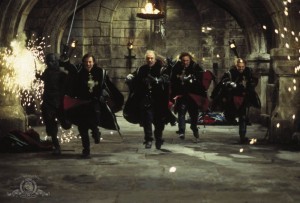 At this, Lieutenant Andre arrests the king, saying, “All I ever wanted to be … was him.”
At this, Lieutenant Andre arrests the king, saying, “All I ever wanted to be … was him.”
Lieutenant Andre helps the musketeers to place Louis in the iron mask and replace him with Philippe. Being an honorable man, Philippe later grants a royal pardon to Louis and allows him to live out his days in a country house, away from the palace, while Philippe – posing as the king – restores order and peace to the country, thereafter remembered asFrance’s greatest ruler.
Honor is sometimes difficult to pinpoint. One man’s honorable actions – such as protecting a corrupt king – might seem dishonorable to someone else – like the musketeers who sought to overthrow him. Yet each person must determine to follow a set of guiding principles that benefit others, often at their own expense. Defending your honor might mean losing your reputation, your friends, your possessions, or even your life.
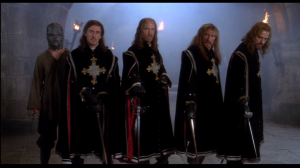 But if it serves others, rather than your own personal ambitions or desires, it’s worth defending.
But if it serves others, rather than your own personal ambitions or desires, it’s worth defending.
Those people who act with honor are the ones who inspire us. Their example of self-sacrifice, courage and dedication lead us to become more like them: to become people of honor ourselves.
But honor is a compliment, after others recognize the way we have lived our lives.
The actions must always come first.
Find more reviews of “The Man in the Iron Mask” at amazon.com!
January 28, 2013
MUSIC/MUSICAL: Bleeding Love – Leona Lewis – Keeping a Tender Heart
Closed off from love, I didn’t need the pain
Once or twice was enough and it was all in vain
Time starts to pass, before you know it you’re frozen
When we try to show someone kindness and they respond by rejecting us or betraying our trust, we’re very cautious about showing the same kindness again. Once bitten, twice shy. Not only do we hesitate to offer the same open and honest love to that person, we also shrink away from showing that love to anyone else.
Some people live out their entire lives following a policy of self-preservation, keeping others at a safe distance. They want to protect their heart from being broken again, so they keep their emotional guard up at all times. They have decided the best way to live life is to live it in self-defense.
 Trying hard not to hear, but they talk so loud
Trying hard not to hear, but they talk so loud
Their piercing sounds fill my ears, try to fill me with doubt
Yet I know that their goal is to keep me from falling
The problem is that such a life can’t be called living. It can be called self-preservation, self-defense and self-serving. But to actually live life, we need to go beyond ourselves and connect with other people. If we focus only on ourselves – even protecting ourselves from emotional harm – we never learn how to love. Love is an action, not merely an emotion, and it requires reaching out to someone else. 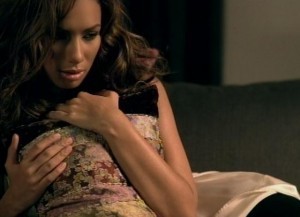 So in order to love – and to truly live – we have to risk being burned again.
So in order to love – and to truly live – we have to risk being burned again.
But nothing’s greater than the risk that comes with your embrace
And in this world of loneliness, I see your face
Yet everyone around me thinks that I’m going crazy
Maybe, maybe
Several years ago, a friend of mine, Janice Ceszyk, shared some wisdom about this issue.  She had reached out to certain people to try to help them, trusting them to hold up their end of the bargain. Instead, she found that some people responded with bitterness, deception and rejection. She wondered why she should keep sacrificing her time and effort to help others or why she should show anyone any kindness at all, rather than just withdraw from everyone and mind her own business. After all, who wants to keep being made a fool of, for loving people who only respond by mistreating you?
She had reached out to certain people to try to help them, trusting them to hold up their end of the bargain. Instead, she found that some people responded with bitterness, deception and rejection. She wondered why she should keep sacrificing her time and effort to help others or why she should show anyone any kindness at all, rather than just withdraw from everyone and mind her own business. After all, who wants to keep being made a fool of, for loving people who only respond by mistreating you?
 But I don’t care what they say, I’m in love with you
But I don’t care what they say, I’m in love with you
They try to pull me away, but they don’t know the truth
My heart’s crippled by the vein that I keep on closing
You cut me open and I
Keep bleeding, keep, keep bleeding love
I keep bleeding, I keep, keep bleeding love
Keep bleeding, keep, keep bleeding love
You cut me open
 But she realized something: if she reaches out to someone in love, or puts her trust and faith in someone to change their ways, only to be disappointed by them later, that does not make her foolish. It simply makes her a loving person who is willing to trust others.
But she realized something: if she reaches out to someone in love, or puts her trust and faith in someone to change their ways, only to be disappointed by them later, that does not make her foolish. It simply makes her a loving person who is willing to trust others.
By contrast, some people allow themselves to be beaten down by the harsh treatment they receive from those they try to love. So they build up calluses on their once-soft hearts, which make it harder for them to love anyone else. They grow so accustomed to protecting themselves from emotional harm that they lose their ability to take emotional risks. They’re focused on maintaining personal safety and control.  Things they can’t always have if they reach out in love.
Things they can’t always have if they reach out in love.
And it’s draining all of me
Though they find it hard to believe
I’ll be wearing these scars for everyone to see
Don’t be afraid of the pain you may suffer for loving, trusting and believing in people. Some of them will surely let you down.  But the heartache they give you is nothing compared to the stone cold heart you could develop if you refuse to show love. Don’t let your heart grow hard and defensive, no matter how many times other people wound you. Keep your heart tender.
But the heartache they give you is nothing compared to the stone cold heart you could develop if you refuse to show love. Don’t let your heart grow hard and defensive, no matter how many times other people wound you. Keep your heart tender.
The fact that your heart can be hurt is evidence that it’s still beating.
Find more reviews of “Spirit” at amazon.com!
January 10, 2013
MOVIE: The Dark Knight Rises – The Crime of Wealth
by Randall Allen Dunn
Most people love the concept of Robin Hood.  Someone who steals from the rich and gives to the poor.
Someone who steals from the rich and gives to the poor.
They love it because they don’t consider themselves rich. We tend to think of rich people as those who have immensely more wealth or possessions than we have. Meanwhile, other people who have lost their homes, lost their jobs, or struggle to find enough food to keep their children from starving, would consider us to be the rich ones.
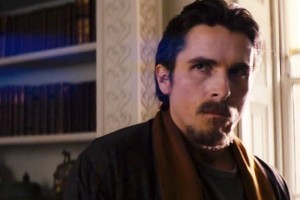 The truth is most of us still have enough to get by. Of course, we would all love to have a better income or a huge windfall to make things easier. We would love to have enough to pay off all our debts and still have enough to buy a nicer car or a nicer house and take a memorable vacation over the summer.
The truth is most of us still have enough to get by. Of course, we would all love to have a better income or a huge windfall to make things easier. We would love to have enough to pay off all our debts and still have enough to buy a nicer car or a nicer house and take a memorable vacation over the summer.
But when we can’t afford to do those things – or can’t afford to do them anytime soon – we start to envy those wealthy people who can afford such luxuries. Those people who don’t have to live paycheck to paycheck or seek a second job. Those people who don’t have to limit their kids to the schools that they can afford. Those people who don’t have to worry about rising insurance or utility rates, rising gas prices, or rising mortgage or rent payments. We start to wonder how we can get some of that money for ourselves. By winning the lottery, winning “American Idol”, or earning a huge tax break.
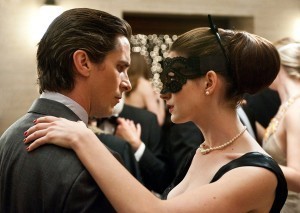 Then we start resenting the rich, wondering why they should have so much of what we want, when we have so little of it.
Then we start resenting the rich, wondering why they should have so much of what we want, when we have so little of it.
We would never call it jealousy. We simply say it’s not fair. We say those rich people don’t deserve to be rich, especially when we’re so poor.
No one considers that if they got all the things they keep wishing for – to get some of that pie for themselves – they would become one of those “undeserving” billionaires they always loathed before. How can it be all right for a poor person to become an overnight billionaire, through little or no genuine effort on their part, if it’s not all right for a billionaire to be a billionaire?
 In the film, “The Dark Knight Rises”, superhero Batman (Christian Bale) has quietly retired amid a storm of controversy, after taking the blame for several murders. Murders that were actually committed by celebrated District Attorney Harvey Dent, who went insane after suffering a horrible accident that marred his face. Commissioner Gordon (Gary Oldman) agreed to hide the truth in order to preserve Dent’s heroic reputation, and also to enforce Dent’s policies that helped eradicate organized crime from Gotham City.
In the film, “The Dark Knight Rises”, superhero Batman (Christian Bale) has quietly retired amid a storm of controversy, after taking the blame for several murders. Murders that were actually committed by celebrated District Attorney Harvey Dent, who went insane after suffering a horrible accident that marred his face. Commissioner Gordon (Gary Oldman) agreed to hide the truth in order to preserve Dent’s heroic reputation, and also to enforce Dent’s policies that helped eradicate organized crime from Gotham City.
Eight years later, a dangerous mercenary named Bane (Tom Hardy) invades Gotham and organizes an army to take control of it. 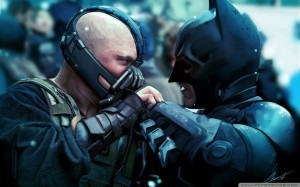 He forges billionaire Bruce (Batman)Wayne’s fingerprints to bankrupt him, then sets off multiple bombs throughout the city. He addresses a crowd of citizens to inform them he will kill anyone who tries to leave Gotham or summon outside help. But he explains he is giving the city to them, having taken it from the corrupt wealthy citizens who had been running it.
He forges billionaire Bruce (Batman)Wayne’s fingerprints to bankrupt him, then sets off multiple bombs throughout the city. He addresses a crowd of citizens to inform them he will kill anyone who tries to leave Gotham or summon outside help. But he explains he is giving the city to them, having taken it from the corrupt wealthy citizens who had been running it.
To prove his claims, he reveals Commissioner Gordon’s agreement to the conspiracy about Harvey Dent, in order to pass the Dent Act that helped incarcerate several dangerous criminals. 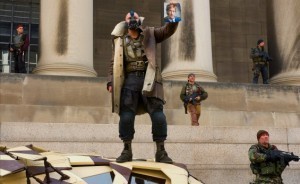 He insists that Gordon’s corruption in allowing this demonstrates that the criminals should never have been imprisoned, so he frees them. Those same criminals then drag wealthy citizens from their homes and hold a kangaroo court to sentence them to death for their “crimes”.
He insists that Gordon’s corruption in allowing this demonstrates that the criminals should never have been imprisoned, so he frees them. Those same criminals then drag wealthy citizens from their homes and hold a kangaroo court to sentence them to death for their “crimes”.
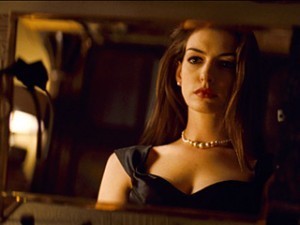 Meanwhile, the rest of the citizens – criminals and hostages alike – are free to take possession of the billionaires’ homes. Cat burglar Selina Kyle (Anne Hathaway) has been longing for this moment, to take charge of the wealth and luxury that those billionaires have kept locked away to themselves. But in order to possess it, she had to betray Batman’s trust, letting him be captured and beaten half to death by Bane. Now that she finally has what she wanted, she realizes that this is not the way she wanted to obtain it.
Meanwhile, the rest of the citizens – criminals and hostages alike – are free to take possession of the billionaires’ homes. Cat burglar Selina Kyle (Anne Hathaway) has been longing for this moment, to take charge of the wealth and luxury that those billionaires have kept locked away to themselves. But in order to possess it, she had to betray Batman’s trust, letting him be captured and beaten half to death by Bane. Now that she finally has what she wanted, she realizes that this is not the way she wanted to obtain it.
Walking through a trashed house, from which its rich owners had been “evicted” by Bane’s mob, she finds a broken picture of a family. A father, a mother, and their children. She tells her partner-in-crime, “This was someone’s home.”
Her friend replies, “And now it belongs to everyone. Isn’t that what you wanted?”
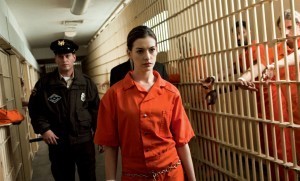 The family in the picture is made of human beings, just like Selina and her accomplice. The only difference is that the people in the picture are rich, and Selina is one of the thieves stealing from them.
The family in the picture is made of human beings, just like Selina and her accomplice. The only difference is that the people in the picture are rich, and Selina is one of the thieves stealing from them.
There’s nothing wrong with wanting something more. A bigger house, fancier clothes, a fatter paycheck. But when we want something that belongs to someone else, we’re on a dangerous path that starts with envy and ends with theft.
It’s easy to justify stealing something from people that we think can afford such losses. Or from someone that – in our opinion – doesn’t deserve to have such things.
But it’s no crime to be rich, any more than it’s a crime to be poor.
Stealing, however, is still a crime.
No matter who you’re stealing from.
Find more reviews of “The Dark Knight Rises” at amazon.com!
The Diamond Goose – a suspense short story
Lester Auger finally found a way to purchase the car of his dreams. He should be careful what he wants …
Lester Auger can’t wait to get his hands on the wheel of a silver Bentley. And he doesn’t. With his success in jewelry store commissions, he can afford to take out a loan from Rico Torriani, a notorious figure with the means to help Lester realize his dreams right away. It’s perfectly safe … until Lester falls behind on his payments. Now Lester’s driven to do something desperate. All he has to do is cover his tracks and trust Mister Torriani to give him a little more time …
December 18, 2012
Yes, VIRGINIA, there is a Santa Claus
Thanks to my brother, David, for forwarding me this reprint from Newseum of the original New York Sun editorial. I hope it inspires and reminds you to keep the wonder of Christmas and the joy of life in your hearts throughout the coming year.
(You can click on the links below for more details of this wonderful story.)
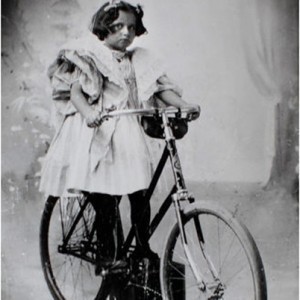 Eight-year-old Virginia O’Hanlon wrote a letter to the editor of New York’s Sun, and the quick response was printed as an unsigned editorial Sept. 21, 1897. The work of veteran newsman Francis Pharcellus Church has since become history’s most reprinted newspaper editorial, appearing in part or whole in dozens of languages in books, movies, and other editorials, and on posters and stamps.
Eight-year-old Virginia O’Hanlon wrote a letter to the editor of New York’s Sun, and the quick response was printed as an unsigned editorial Sept. 21, 1897. The work of veteran newsman Francis Pharcellus Church has since become history’s most reprinted newspaper editorial, appearing in part or whole in dozens of languages in books, movies, and other editorials, and on posters and stamps.
DEAR EDITOR:
I am 8 years old.
Some of my little friends say there is no Santa Claus.
Papa says, “If you see it in THE SUN it’s so.”
Please tell me the truth; is there a Santa Claus?
115 WEST NINETY-FIFTH STREET.
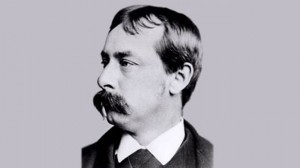 VIRGINIA, your little friends are wrong. They have been affected by the skepticism of a skeptical age. They do not believe except they see. They think that nothing can be which is not comprehensible by their little minds. All minds, Virginia, whether they be men’s or children’s, are little. In this great universe of ours man is a mere insect, an ant, in his intellect, as compared with the boundless world about him, as measured by the intelligence capable of grasping the whole of truth and knowledge.
VIRGINIA, your little friends are wrong. They have been affected by the skepticism of a skeptical age. They do not believe except they see. They think that nothing can be which is not comprehensible by their little minds. All minds, Virginia, whether they be men’s or children’s, are little. In this great universe of ours man is a mere insect, an ant, in his intellect, as compared with the boundless world about him, as measured by the intelligence capable of grasping the whole of truth and knowledge.
Yes, VIRGINIA, there is a Santa Claus. He exists as certainly as love and generosity and devotion exist, and you know that they abound and give to your life its highest beauty and joy. Alas! how dreary would be the world if there were no Santa Claus. It would be as dreary as if there were no VIRGINIAS. There would be no childlike faith then, no poetry, no romance to make tolerable this existence. We should have no enjoyment, except in sense and sight. The eternal light with which childhood fills the world would be extinguished.
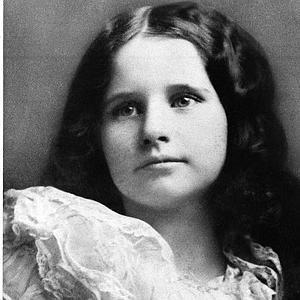 Not believe in Santa Claus! You might as well not believe in fairies! You might get your papa to hire men to watch in all the chimneys on Christmas Eve to catch Santa Claus, but even if they did not see Santa Claus coming down, what would that prove? Nobody sees Santa Claus, but that is no sign that there is no Santa Claus. The most real things in the world are those that neither children nor men can see. Did you ever see fairies dancing on the lawn? Of course not, but that’s no proof that they are not there. Nobody can conceive or imagine all the wonders there are unseen and unseeable in the world.
Not believe in Santa Claus! You might as well not believe in fairies! You might get your papa to hire men to watch in all the chimneys on Christmas Eve to catch Santa Claus, but even if they did not see Santa Claus coming down, what would that prove? Nobody sees Santa Claus, but that is no sign that there is no Santa Claus. The most real things in the world are those that neither children nor men can see. Did you ever see fairies dancing on the lawn? Of course not, but that’s no proof that they are not there. Nobody can conceive or imagine all the wonders there are unseen and unseeable in the world.
You may tear apart the baby’s rattle and see what makes the noise inside, but there is a veil covering the unseen world which not the strongest man, nor even the united strength of all the strongest men that ever lived, could tear apart. Only faith, fancy, poetry, love, romance, can push aside that curtain and view and picture the supernal beauty and glory beyond. Is it all real? Ah, VIRGINIA, in all this world there is nothing else real and abiding.
No Santa Claus! Thank God! he lives, and he lives forever. A thousand years from now, Virginia, nay, ten times ten thousand years from now, he will continue to make glad the heart of childhood.
Merry Christmas to all!
- RAD
Still doubting? Click here for my FAST READ e-book, “Santa’s Chair”.
Seven-year old Henry Burrows is anxious to know whether Santa Claus is real. In the face of his father’s lay-off and his mother’s fears that Christmas might not come this year, it grows harder to believe. It would take a miracle for his family to celebrate Christmas now. The kind of miracle that only the real Santa could provide. If the old man in the Sears & Roebuck store can somehow grant Henry’s wish …
November 28, 2012
MOVIE: On Strike for Christmas – Help for the Holidays
by Randall Allen Dunn
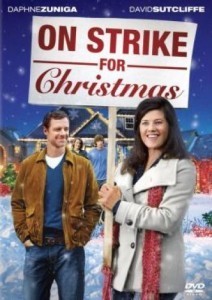 When Nicki suggested using a Lifetime movie for a blog, I wasn’t sure it was a good idea. Neither of us watch many Lifetime movies, and the ones we do watch often seem contrived. Like the Barbie movies my daughter watches or the James Bond movies I watch, Lifetime movies tend to create a fantasy world in which all the characters act in a way that validates the main character’s viewpoint, instead of acting the way people really act. So while sycophantic men cater to Barbie’s latest whims and easily-won women cater to James Bond’s endless libido, the family and friends of Lifetime movie women all rally around the lead heroine in whatever she decides to do, with a “You go, girl!” attitude. Kind of like a women’s daytime talk show transformed into a movie.
When Nicki suggested using a Lifetime movie for a blog, I wasn’t sure it was a good idea. Neither of us watch many Lifetime movies, and the ones we do watch often seem contrived. Like the Barbie movies my daughter watches or the James Bond movies I watch, Lifetime movies tend to create a fantasy world in which all the characters act in a way that validates the main character’s viewpoint, instead of acting the way people really act. So while sycophantic men cater to Barbie’s latest whims and easily-won women cater to James Bond’s endless libido, the family and friends of Lifetime movie women all rally around the lead heroine in whatever she decides to do, with a “You go, girl!” attitude. Kind of like a women’s daytime talk show transformed into a movie.
“On Strike for Christmas” seemed to have all the earmarks of such a film. Joy Robertson (Daphne Zuniga) gets fed up with her husband and teenage sons leaving her to do all the work planning their holiday parties while they do nothing to contribute. 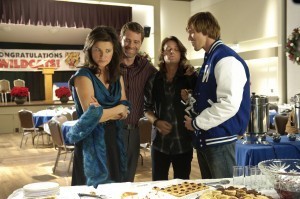 Between her husband’s faculty party for his professorial colleagues and her sons’ parties for a basketball team and a garage band, Joy has no time to do all the work herself. But when she asks the family to help, they are all too busy. Her husband, Stephen (David Sutcliffe), is grading papers and writing a novel, while her sons are busy with scholarship applications, basketball and guitar practices and a girlfriend. So Joy is expected to work, work, work and get everything ready for Christmas to “magically” appear while everyone else runs out the door.
Between her husband’s faculty party for his professorial colleagues and her sons’ parties for a basketball team and a garage band, Joy has no time to do all the work herself. But when she asks the family to help, they are all too busy. Her husband, Stephen (David Sutcliffe), is grading papers and writing a novel, while her sons are busy with scholarship applications, basketball and guitar practices and a girlfriend. So Joy is expected to work, work, work and get everything ready for Christmas to “magically” appear while everyone else runs out the door.
 Instead, Joy goes on “strike”, listing off demands for her family to appreciate all the work she puts into Christmas and pitch in and help, without being asked or prodded.
Instead, Joy goes on “strike”, listing off demands for her family to appreciate all the work she puts into Christmas and pitch in and help, without being asked or prodded.
Fortunately, Joy’s family cares enough to recognize she has a point. Unfortunately, they take exactly the wrong approach to help out. Assuming Joy’s Christmas cookie recipe will be easy to make, Stephen directs the sons to bake them one afternoon. 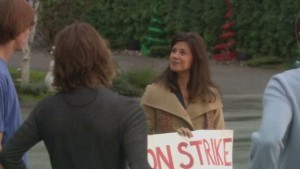 The resulting catastrophe creates avery messy kitchen but results in no cookies. So they hire a baker to put it together from Joy’s recipe.
The resulting catastrophe creates avery messy kitchen but results in no cookies. So they hire a baker to put it together from Joy’s recipe.
When Joy figures out what they did, she gets a local newspaper to interview her about her strike. In the article, Joy explains her reason for the strike and also tells how her family tried to trick her in order to get out of doing any of the work. 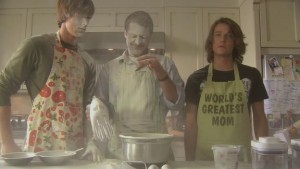 As they return to work and school the next day, Stephen and the boys get angry glares from women and mocking comments from men, branded as selfish and uncaring slobs. In fact, plenty of women side with Joy and decide to go on “strike” themselves.
As they return to work and school the next day, Stephen and the boys get angry glares from women and mocking comments from men, branded as selfish and uncaring slobs. In fact, plenty of women side with Joy and decide to go on “strike” themselves.
The men retaliate with their own article in the same newspaper, telling about how Joy insists on doing everything a certain way for Christmas. They explain that their own attempts to help out with the holiday preparations are not appreciated because they’re not being done the way Joy wanted them done.
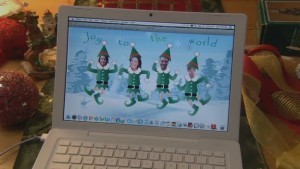 Joy’s mother, Erna (Julia Duffy), who never supported the Christmas strike, encourages Joy to decide what she really wants out of it. Joy begins to recognize that her family did put effort into Christmas, even though it wasn’t what she would have done. Still, she’s concerned when a friend tells her she got a Christmas e-card from her family, rather than the usual mailed card. But when Joy sees the animated figures of herself and her family, with her son playing his original Christmas song for it, she realizes that although it’s totally different from what she would have done … she likes it.
Joy’s mother, Erna (Julia Duffy), who never supported the Christmas strike, encourages Joy to decide what she really wants out of it. Joy begins to recognize that her family did put effort into Christmas, even though it wasn’t what she would have done. Still, she’s concerned when a friend tells her she got a Christmas e-card from her family, rather than the usual mailed card. But when Joy sees the animated figures of herself and her family, with her son playing his original Christmas song for it, she realizes that although it’s totally different from what she would have done … she likes it.
 Still, some household organizational tasks require the hand of an experienced professional. When people begin arriving at their house for the husband’s faculty party, the men quickly discover that they have accidentally scheduled all three of their parties for the same night. Joy quickly steps in to coordinate the guests into three separate rooms, with Erna’s help … as well as the help of Stephen and the boys. Soon all three parties are running smoothly in separate areas of the house, and Christmas is saved.
Still, some household organizational tasks require the hand of an experienced professional. When people begin arriving at their house for the husband’s faculty party, the men quickly discover that they have accidentally scheduled all three of their parties for the same night. Joy quickly steps in to coordinate the guests into three separate rooms, with Erna’s help … as well as the help of Stephen and the boys. Soon all three parties are running smoothly in separate areas of the house, and Christmas is saved.
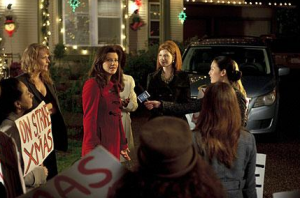 More important, the family is saved. When a television reporter shows up to interview Joy that same night about the strike, Joy tells the news cameras that she realized she was feeling obsolete with her sons moving away to college, so she just wanted her last Christmas with them to be perfect. But seeing the efforts her family made to help out showed her how much they appreciate her. So she declares that her strike is over, and she encourages the rest of the striking women to end theirs as well.
More important, the family is saved. When a television reporter shows up to interview Joy that same night about the strike, Joy tells the news cameras that she realized she was feeling obsolete with her sons moving away to college, so she just wanted her last Christmas with them to be perfect. But seeing the efforts her family made to help out showed her how much they appreciate her. So she declares that her strike is over, and she encourages the rest of the striking women to end theirs as well.
 In gratitude, the men sign a family pact to always celebrate Christmas together and to all contribute in the planning and the work. Joy signs it with them, knowing what really matters is not the trappings of Christmas, but celebrating it together as a family.
In gratitude, the men sign a family pact to always celebrate Christmas together and to all contribute in the planning and the work. Joy signs it with them, knowing what really matters is not the trappings of Christmas, but celebrating it together as a family.
I wasn’t sure a Lifetime movie would make a great blog, since … well, only because it’s a Lifetime movie. But Nicki wisely pointed out that it had everything I needed for a great blog. When I got over thinking I had to do this blog a certain way, I realized she was completely right.
I’m glad I listened to my wife.
Merry Christmas!
Find more reviews of “On Strike for Christmas” at amazon.com!
October 30, 2012
MOVIE: The Avengers – Assembly Required
by Randall Allen Dunn
 Having grown up with both comic books and movies, I never expected to see anyone make a movie about an entire team of superheroes. I was a kid when moviemakers went to great lengths and plenty of screen time to make moviegoers believe a man could fly in “Superman: the Movie”. It was hard enough to convince audiences that one person could develop incredible superpowers and fight crime. To convince people that several such individuals could exist, it seemed they would have to introduce each of the heroes individually first, one movie at a time.
Having grown up with both comic books and movies, I never expected to see anyone make a movie about an entire team of superheroes. I was a kid when moviemakers went to great lengths and plenty of screen time to make moviegoers believe a man could fly in “Superman: the Movie”. It was hard enough to convince audiences that one person could develop incredible superpowers and fight crime. To convince people that several such individuals could exist, it seemed they would have to introduce each of the heroes individually first, one movie at a time.
And they did. In a long-term endeavor, the Avengers were introduced through separate films, with each one hinting in post-credit scenes that the future Avengers team would be formed. 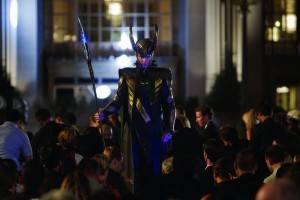 The result was an impressive and entertaining team of characters with very distinct personalities and powers, creating a “star-studded” superhero movie.
The result was an impressive and entertaining team of characters with very distinct personalities and powers, creating a “star-studded” superhero movie.
Of course, for it to work, these intriguing and powerful individuals had to learn how to function as a team. Which meant letting go of their individual agendas.
When an interstellar demi-God named Loki (Tom Hiddleston) attackes the secret government agency, S.H.I.E.L.D. and brainwashes one of their agents, 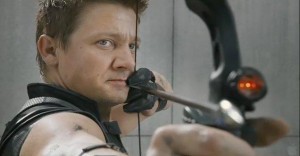 Clint Barton (Jeremy Renner) – also known as Hawkeye – Col. Nick Fury (Samuel L. Jackson) decides to draw together these superheroes for help. Loki intends to take over the earth with an onslaught of alien monsters, once he establishes a portal that allows them direct entry into the human world.
Clint Barton (Jeremy Renner) – also known as Hawkeye – Col. Nick Fury (Samuel L. Jackson) decides to draw together these superheroes for help. Loki intends to take over the earth with an onslaught of alien monsters, once he establishes a portal that allows them direct entry into the human world.
Fury sends another S.H.I.E.L.D. agent, Natasha Romanoff (Scarlett Johansson) – known as the Black Widow –  to recruit one of the most dangerous and reclusive would-be members, Dr. Bruce Banner (Mark Ruffalo), whose anger triggers a transformation that transforms him into the raging monster known as the Hulk. Banner makes it clear that he doesn’t trust S.H.I.E.L.D. or the United States government, whose military have often hunted him down to try to use his monstrous persona as a weapon. But he agrees to come along when he learns that Romanoff wants to recruit him for his scientific expertise rather than his power as the Hulk,
to recruit one of the most dangerous and reclusive would-be members, Dr. Bruce Banner (Mark Ruffalo), whose anger triggers a transformation that transforms him into the raging monster known as the Hulk. Banner makes it clear that he doesn’t trust S.H.I.E.L.D. or the United States government, whose military have often hunted him down to try to use his monstrous persona as a weapon. But he agrees to come along when he learns that Romanoff wants to recruit him for his scientific expertise rather than his power as the Hulk,  so that he can help analyze the tesseract that threatens to open up a portal to Loki’s world.
so that he can help analyze the tesseract that threatens to open up a portal to Loki’s world.
The government also recruits the self-obsessed, irreverent billionaire Tony Stark (Robert Downey, Jr.), whose high-tech flying armor earned him the name ofIronMan.When he sees the potential danger of the threat, Stark also agrees to tag along.
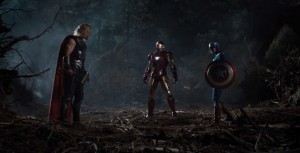 Fury himself approaches Steve Rogers (Chris Evans), who made a heroic name for himself as Captain America during World War II. Having just been revived from suspended animation,Rogersis now trapped in a world where all of his old friends and comrades are dead. All he knows now is his commitment to serve his country in whatever way he can, even if he no longer fits in with modern society.
Fury himself approaches Steve Rogers (Chris Evans), who made a heroic name for himself as Captain America during World War II. Having just been revived from suspended animation,Rogersis now trapped in a world where all of his old friends and comrades are dead. All he knows now is his commitment to serve his country in whatever way he can, even if he no longer fits in with modern society.
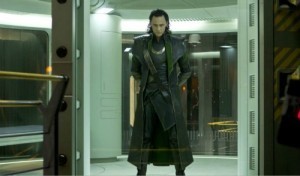 When Iron Man and Captain America confront Loki, they encounter Loki’s powerful half-brother, Thor (Chris Hemsworth), who insists on dealing with Loki himself. He assures the others that this matter is beyond their ability to handle. But the three of them make a temporary truce and agree to take the captured Loki to S.H.I.E.L.D.
When Iron Man and Captain America confront Loki, they encounter Loki’s powerful half-brother, Thor (Chris Hemsworth), who insists on dealing with Loki himself. He assures the others that this matter is beyond their ability to handle. But the three of them make a temporary truce and agree to take the captured Loki to S.H.I.E.L.D.
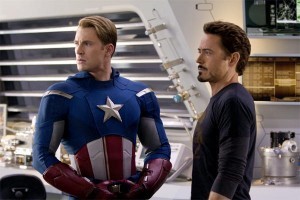 The team’s various personalities and personal goals soon come into sharp conflict. Particularly between the all-business, all-dutiful Captain America and the clownish egocentrism of Iron Man, who finds Captain America’s concepts of self-sacrifice for a greater cause to be old-fashioned and unrealistic.
The team’s various personalities and personal goals soon come into sharp conflict. Particularly between the all-business, all-dutiful Captain America and the clownish egocentrism of Iron Man, who finds Captain America’s concepts of self-sacrifice for a greater cause to be old-fashioned and unrealistic.
Even harder to bring together are the Hulk and Thor, 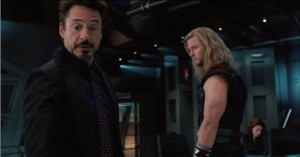 neither of whom whish to spend any more time with the group than they have to. Thor has little faith in the team’s abilities, and the Hulk doesn’t trust their intentions or their concern for his own welfare.
neither of whom whish to spend any more time with the group than they have to. Thor has little faith in the team’s abilities, and the Hulk doesn’t trust their intentions or their concern for his own welfare.
Ultimately, they learn that each member of the team has something unique and vital to offer. Banner and Iron Man challenge CaptainAmerica’s blind allegiance to S.H.I.E.L.D.,  when the evidence shows they are hiding something. This leads Captain America to do some private investigation of S.H.I.E.L.D. and learn that they themselves plan to use the tesseract as a weapon, which the other team members consider too dangerous to be left in any government’s hands.
when the evidence shows they are hiding something. This leads Captain America to do some private investigation of S.H.I.E.L.D. and learn that they themselves plan to use the tesseract as a weapon, which the other team members consider too dangerous to be left in any government’s hands.
When the Avengers finally mount a united attack against the invading alien forces, Captain America assumes leadership, using his military strategy to direct each member in using their individual skills to the best effect. 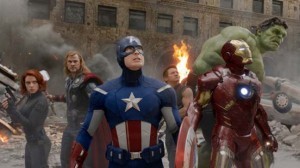 Trusting his direction, the other members follow his instructions and repel the invaders.
Trusting his direction, the other members follow his instructions and repel the invaders.
Even Iron Man, after ridiculing Captain America’s ideas of self-sacrifice, realizes the value of such ideals when he is forced to sacrifice himself. Using his suit’s power, he seals the portal and stops the invasion, but in the process cuts himself off from his own world as he pushes through it to the alien world. Captain America’s noble example led him to understand what it means to make such a hard choice. To be a genuine hero.
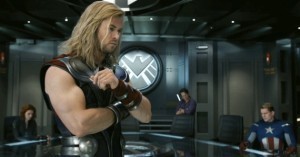 Fortunately, Thor uses the power of his mystical hammer to pull Iron Man back from the portal, and the team is briefly re-united before calling it a day, to part as friends and comrades. Despite their differences and individual agendas, they now know they can all work together again if the need arises,
Fortunately, Thor uses the power of his mystical hammer to pull Iron Man back from the portal, and the team is briefly re-united before calling it a day, to part as friends and comrades. Despite their differences and individual agendas, they now know they can all work together again if the need arises,
 Having great skills and abilities make us each a valued member of a team. But if we can’t also choose to contribute our gifts for the good of our teammates, instead of holding back to benefit ourselves alone, we will never truly be part of that team.
Having great skills and abilities make us each a valued member of a team. But if we can’t also choose to contribute our gifts for the good of our teammates, instead of holding back to benefit ourselves alone, we will never truly be part of that team.
Which means we will never be as strong as we could have been.
Find more reviews of “The Avengers” at amazon.com!
September 26, 2012
TELEVISION/TV SERIES: Victorious – What’s She Got That I Haven’t Got … Besides My Old Boyfriend?
by Randall Allen Dunn
 No one likes being rejected. We all work hard to persuade others to like us, either for who we are or for who we think they want us to be. We’re often so hungry for acceptance that we’re willing to change our public appearance and persona in order to fit in.
No one likes being rejected. We all work hard to persuade others to like us, either for who we are or for who we think they want us to be. We’re often so hungry for acceptance that we’re willing to change our public appearance and persona in order to fit in.
So when rejection comes, it’s hard to handle. Especially if we’re depending on the acceptance of others for our own self-worth.
The television series, “Victorious”, features Tory Vega (Victoria Justice), a teenage girl who has transferred to a high school forHollywoodhopefuls. In one episode, her former boyfriend from the last school, Danny (Matt Angel), surprises her by appearing there. When she asks Danny what he’s doing atHollywoodArtsHigh School, he explains he’s visiting his new girlfriend 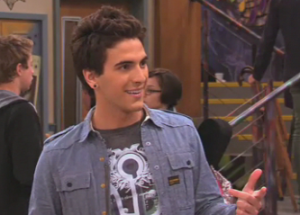 – who happens to be Tory’s best friend, Cat (Ariana Grande).
– who happens to be Tory’s best friend, Cat (Ariana Grande).
After a very awkward moment, Tory and Danny encourage everyone to relax, since Tory ended her relationship with Danny a long time ago. Still, Tory’s rival, Jade (Elizabeth Gillies), encourages any tension she can play up to make Tory squirm.
Which works well for her when Cat makes brownies for Danny and Tory insists that Danny won’t eat brownies. When Cat makes Danny try one, he finds they’re delicious. 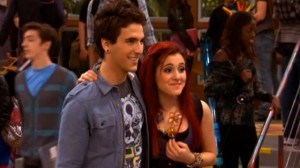 Tory can’t understand why he likes them when she had made him brownies twice and he claimed he didn’t like brownies. When Tory tries one of the brownies herself, she discovers that Cat bakes much better than she does.
Tory can’t understand why he likes them when she had made him brownies twice and he claimed he didn’t like brownies. When Tory tries one of the brownies herself, she discovers that Cat bakes much better than she does.
Later at a party, Tory finds Danny and Cat in a passionate kiss. She suddenly snaps and turns up the pressure of a cheese fondue fountain nearby them, spraying them both with melted cheese. Danny and Cat are stunned. So are all the other kids who witness the attack.
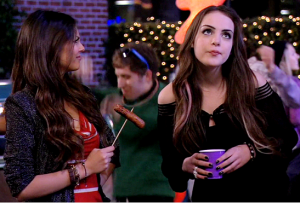 So is Tory. She can’t explain why she did it, since she’s not sure herself. She runs off, ashamed and humiliated.
So is Tory. She can’t explain why she did it, since she’s not sure herself. She runs off, ashamed and humiliated.
Later, she tries to apologize to Cat, but instead runs into Danny instead, who tells her that Cat is still busy trying to get cheese out of her hair. Tory apologizes to Danny and assures him she wants the two of them to be happy together. Danny asks Tory she’s acting this way when she’s the one that dumped him. He asks if she’s still harboring feeling for him, and she insists that she’s not.
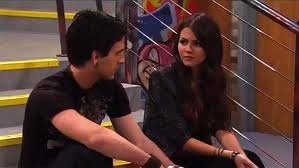 The next moment, they’re kissing one another.
The next moment, they’re kissing one another.
Just as Cat emerges from the bathroom to see them. Devastated, she runs off before Tory can catch her.
Cat refuses to take Tory’s calls and avoids her at school. Until Tory finally corners her and drags her into a broom closet so they can talk. She tells Cat how sorry she is for acting so strange.
“You sprayed cheese on me and then kissed my boyfriend. Why would you be mean to me?” Cat asks.
 “I don’t know,” Tory says, wishing she knew why she acted in such a cruel and inconsiderate manner. “Maybe I did still have a few tiny little feelings left for Danny. And maybe that’s why I went a little crazy, seeing you two be all mushy together.”
“I don’t know,” Tory says, wishing she knew why she acted in such a cruel and inconsiderate manner. “Maybe I did still have a few tiny little feelings left for Danny. And maybe that’s why I went a little crazy, seeing you two be all mushy together.”
“You could’ve just talked to me about it,” Cat says.
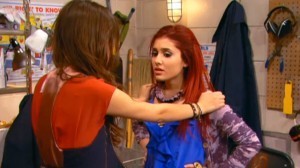 “I know. What I did was terrible and awful and immature and you have every right to be furious with me. I swear, Cat, if I were you, I’d just punch me right in the face.”
“I know. What I did was terrible and awful and immature and you have every right to be furious with me. I swear, Cat, if I were you, I’d just punch me right in the face.”
Cat, being naïve, complies, and socks Tory’s nose. Tory explains through her pain that her statement was just something that people say. Thankfully, all is forgiven as Cat takes Tory to the emergency room.
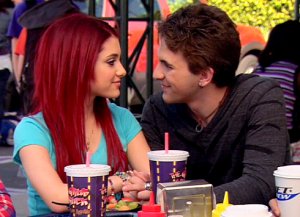 Tory got caught in a trap of emotions that ran so deep she couldn’t even see them. She already knew that Danny wasn’t the right guy for her, which was why she broke it off. But when she saw him giving such lavish attention and affection to someone else – even when that someone was her best friend – she only saw her own hurt. Her own loss of the boyfriend she could have had. Even if it wasn’t the right boyfriend for her.
Tory got caught in a trap of emotions that ran so deep she couldn’t even see them. She already knew that Danny wasn’t the right guy for her, which was why she broke it off. But when she saw him giving such lavish attention and affection to someone else – even when that someone was her best friend – she only saw her own hurt. Her own loss of the boyfriend she could have had. Even if it wasn’t the right boyfriend for her.
When someone else is chosen over us – for a job, a position on a team, or even a relationship – we wonder what’s wrong with us. We rarely consider the qualities or strengths of the other person that made people choose them. We’re too focused on ourselves and our imagined shortcomings.
But each person is unique. In truth, you and I are not the right people to pick for every opportunity or project, let alone for every person to date. 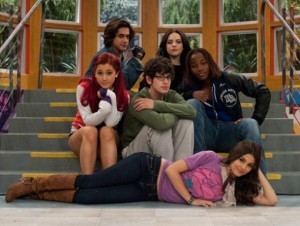 We all have flaws as well as strengths. And even if our personal attributes make us seem like the perfect candidate for some opportunity or special relationship, we can’t force other people to recognize it and choose us. The choice is theirs. But our choice to appreciate ourselves and the qualities of others is a choice we can make. Once we do, knowing we won’t always be chosen, we can be free to be happy for the person who received something wonderful.
We all have flaws as well as strengths. And even if our personal attributes make us seem like the perfect candidate for some opportunity or special relationship, we can’t force other people to recognize it and choose us. The choice is theirs. But our choice to appreciate ourselves and the qualities of others is a choice we can make. Once we do, knowing we won’t always be chosen, we can be free to be happy for the person who received something wonderful.
Especially when it’s someone we consider a friend.
Find more reviews of “Victorious Season 1, Volume 2” at amazon.com!
August 31, 2012
MOVIE: Yours, Mine & Ours – How to Make a Divorce
by Randall Allen Dunn
 Divorce is easy. Marriage is hard.
Divorce is easy. Marriage is hard.
We’ve probably heard something like that before, but we don’t always follow through to apply it. Of course, no one enjoys divorce, and I realize there are some extreme situations in which divorce becomes necessary, when there is physical danger to a spouse or children.
Most divorces don’t fall into that category.
More often, what makes a divorce are little things that start out as small slights and offenses. Over time, they become a pile, then a mountain, and then ultimately, a divorce. Most irreconcilable differences were very reconcilable at one point, but one or both spouses let those problems spiral out of control until they no longer knew how to address them.
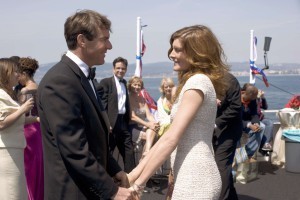 If, that is – they ever knew how to address them in the first place. If those problems had been dealt with when they surfaced, that couple’s marriage might have easily weathered the storm and stayed afloat instead of sinking.
If, that is – they ever knew how to address them in the first place. If those problems had been dealt with when they surfaced, that couple’s marriage might have easily weathered the storm and stayed afloat instead of sinking.
In the 2005 remake of the film, “Yours, Mine & Ours”, naval officer Frank Beardsley (Dennis Quaid), a widowed father of eight, runs into his high school sweetheart, Helen North (Rene Russo), a widowed mother of ten. After catching up again and falling in love all over again, they throw caution to the wind and get married aboard a cruise ship.
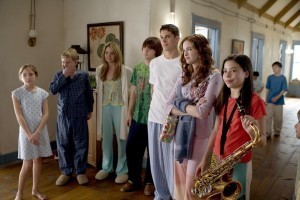 Their kids are a little surprised. Let’s be honest: they didn’t plan this very well, for themselves or their family.
Their kids are a little surprised. Let’s be honest: they didn’t plan this very well, for themselves or their family.
But Frank and Helen are determined to make it work, despite his regimented approach to running a house and her free-spirited approach. They believe their loving commitment can overcome whatever obstacles life – and their kids – throw at them.
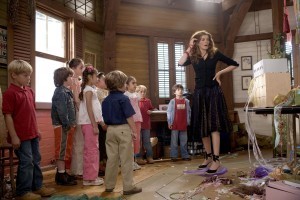 They’re wrong. The kids soon realize that the only way to get rid of their new annoying siblings is to get their parents to split up. So they secretly band together to set their parents against each other.
They’re wrong. The kids soon realize that the only way to get rid of their new annoying siblings is to get their parents to split up. So they secretly band together to set their parents against each other.
It’s amazing how easy it is. All they needed to do was re-organize Helen’s messy design studio, the week she was commissioned to do a lot of work for a major fashion client. When Frank sees the room, he thinks it looks great – “shipshape”. He doesn’t notice how upset Helen is that she can’t find any of her materials to work.
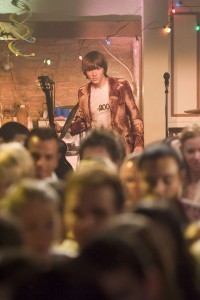 To set Frank off, they just needed to ask Helen for permission to have some friends over, allowing an all-out destructive party at their beautiful new home. When Frank clears out the horde of guests by threatening to draft them into the Navy, the kids explain that Helen said it would be okay.
To set Frank off, they just needed to ask Helen for permission to have some friends over, allowing an all-out destructive party at their beautiful new home. When Frank clears out the horde of guests by threatening to draft them into the Navy, the kids explain that Helen said it would be okay.
Frank and Helen soon become far less enamored with one another. She’s tired of his heavy-handedness and he’s tired of her refusal to live by any standards. They’re ready to call it quits, realizing they rushed into their marriage blindly.
 And, of course, they did. It seems that a lot of people fail to plan ahead when they choose who to marry, to help ensure their marriage survives.
And, of course, they did. It seems that a lot of people fail to plan ahead when they choose who to marry, to help ensure their marriage survives.
And, no, it’s not to make promises to always love one another, no matter what.
 It’s discussing more practical, less romantic things, like how many children to have, and how to raise and discipline them. Or what career goals each person has, and how they like to spend their spare time. Or how to work together on a project, like doing the daily boring chores of cleaning and maintaining a house, paying the bills, and making friends with new neighbors. Of course, those plans can, and will, change, especially after you get married. But if you want a houseful of kids and your lovely partner wants none, you’ll be in for a big shock when you have that conversation after you’re already married. If you want to move to whatever city offers the best job promotion while your spouse wants to settle in one town, you might start to feel resentment over your sacrifices if you didn’t expect to make it.
It’s discussing more practical, less romantic things, like how many children to have, and how to raise and discipline them. Or what career goals each person has, and how they like to spend their spare time. Or how to work together on a project, like doing the daily boring chores of cleaning and maintaining a house, paying the bills, and making friends with new neighbors. Of course, those plans can, and will, change, especially after you get married. But if you want a houseful of kids and your lovely partner wants none, you’ll be in for a big shock when you have that conversation after you’re already married. If you want to move to whatever city offers the best job promotion while your spouse wants to settle in one town, you might start to feel resentment over your sacrifices if you didn’t expect to make it.
In short, they should have communicated. Before and during their marriage, not after. When they become annoyed with each other’s habits, or concerned about their plans for the future. 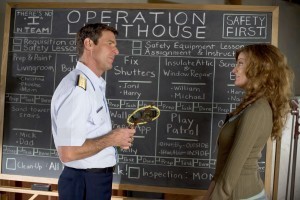 They needed to recognize that to preserve their marriage, they had to join forces. To not view themselves as separate people, calling things “my money” or “my career” or “my kids”, but sharing all of it and calling it “ours”.
They needed to recognize that to preserve their marriage, they had to join forces. To not view themselves as separate people, calling things “my money” or “my career” or “my kids”, but sharing all of it and calling it “ours”.
Once a couple recognizes that they’re in it together, they realize they can’t just let problems fester. They have to work together to resolve them, before they grow too huge to handle. If Frank and Helen had talked about their concerns openly and honestly when they first arose, the kids’ shortsighted plans to break up their marriage would never have gained any ground.
In the end, the kids realize how happy Frank and Helen were together, and confess their scheme. Frank and Helen then realize they do still love one another and can work things out, if they’re willing to work through it. Together.
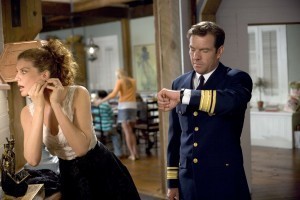 People usually divorce over bitter feelings and arguments that turn into spiteful comments and humiliations, when spouses treat one another with contempt instead of honoring one another. It starts the same way that every other broken friendship starts: one person says or does something that hurts the other person’s feelings, and they never address it. Because they never learned how to talk to one another. To get past the gooey emotions and get down to the practical working out of their love.
People usually divorce over bitter feelings and arguments that turn into spiteful comments and humiliations, when spouses treat one another with contempt instead of honoring one another. It starts the same way that every other broken friendship starts: one person says or does something that hurts the other person’s feelings, and they never address it. Because they never learned how to talk to one another. To get past the gooey emotions and get down to the practical working out of their love.
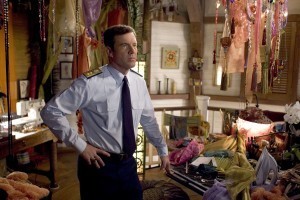 If you love someone, you’ll learn how to express your personal needs, despite how uncomfortable it makes you. You’ll learn how to give up some activities that otherwise seemed all-important. You’ll learn how to do whatever it takes to keep that person standing beside you.
If you love someone, you’ll learn how to express your personal needs, despite how uncomfortable it makes you. You’ll learn how to give up some activities that otherwise seemed all-important. You’ll learn how to do whatever it takes to keep that person standing beside you.
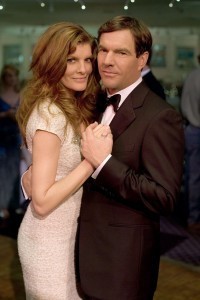 But if it’s not that important to stay together, then divorce is always an easy option. It’s always easy to stay offended, to treat minor slights as major insults, to disregard someone else’s needs because they disregarded yours. It’s always easy to say you’ll change if they do, or to promise you’ll tell them you love them if they tell you first. When you put your spouse first and yourself second, you’ll be taking the first step toward putting your marriage back together. Until you do that, you’re still heading toward divorce. But if you can get past the small things by letting go of the disappointments, inconveniences and discomfort, you’ll be able to save something far more valuable: your marriage.
But if it’s not that important to stay together, then divorce is always an easy option. It’s always easy to stay offended, to treat minor slights as major insults, to disregard someone else’s needs because they disregarded yours. It’s always easy to say you’ll change if they do, or to promise you’ll tell them you love them if they tell you first. When you put your spouse first and yourself second, you’ll be taking the first step toward putting your marriage back together. Until you do that, you’re still heading toward divorce. But if you can get past the small things by letting go of the disappointments, inconveniences and discomfort, you’ll be able to save something far more valuable: your marriage.
Find more reviews of “Yours, Mine & Ours” at amazon.com!
July 17, 2012
CARTOON/COMIC: The Dark Knight – Rebirth
by Randall Allen Dunn
A life without purpose is, by definition, a meaningless life.
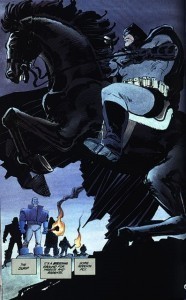 Thankfully, every person has a purpose. Sometimes they can’t see what it is. If a person doesn’t know what their purpose in life, it’s hard for them to truly enjoy living. They can’t find any sense of peace or freedom because they don’t know the meaning of their own life. Each individual needs to know what makes them unique, and the individual contribution they bring to others, often simply by showing up.
Thankfully, every person has a purpose. Sometimes they can’t see what it is. If a person doesn’t know what their purpose in life, it’s hard for them to truly enjoy living. They can’t find any sense of peace or freedom because they don’t know the meaning of their own life. Each individual needs to know what makes them unique, and the individual contribution they bring to others, often simply by showing up.
My own joy, peace and confidence come from my relationship with Christ, who takes care of all my needs. My sense of individual purpose comes through my writing, my encouragement to others, my teaching, and my acceptance and support of people. The way I do each of those things is unique, completely different from the way any other writer, teacher, encourager or friend will do it. Which makes my contribution important. It gives my life meaning.
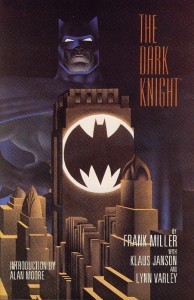 In Frank Miller’s graphic novel, The Dark Knight, legendary superhero Batman has gone into retirement. He now relaxes in his civilian identity as billionaire Bruce Wayne, occasionally sharing a drink with his old friend, former Commisioner Gordon, and fending off the sarcastic jibes of his longtime butler, Alfred, who criticizes his excessive drinking and other self-destructive tendencies. In the old days, Bruce lived a dangerous lifestyle, putting on a mask and chasing down criminals. Back then, his pursuits had a purpose. Now he’s a thrill-seeker, bent on chasing one destructive activity after another, less for the pleasure of life than for the satisfaction of a glorious death.
In Frank Miller’s graphic novel, The Dark Knight, legendary superhero Batman has gone into retirement. He now relaxes in his civilian identity as billionaire Bruce Wayne, occasionally sharing a drink with his old friend, former Commisioner Gordon, and fending off the sarcastic jibes of his longtime butler, Alfred, who criticizes his excessive drinking and other self-destructive tendencies. In the old days, Bruce lived a dangerous lifestyle, putting on a mask and chasing down criminals. Back then, his pursuits had a purpose. Now he’s a thrill-seeker, bent on chasing one destructive activity after another, less for the pleasure of life than for the satisfaction of a glorious death.
He feels his life is over and he wants to end it all. To put himself out of his own misery.
Then he considers the state of the world. The way crime has evolved, fostering young gangs who don’t have the slightest regard for life. In the face of such unreasoning evil, what can an old man like Bruce even do?
After a series of events reminds Bruce of his original reason for becoming Batman, to avenge the murders of his parents, he realizes he cannot escape his purpose. No matter how old and limited he becomes, his passion remains the same.
So he dons the mask and cape once more and hits the streets.
I should be a mass of aching muscle – broken, spent, unable to move.
And, were I an older man, I surely would.
But I’m a man of thirty – of twenty again.
The rain on my chest is a baptism –
I’m born again …
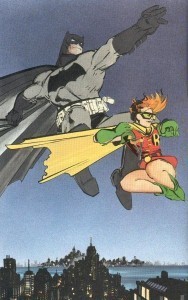 Finding your true purpose brings a fresh energy and passion to your spirit. It brings you back to life. It’s when you fail to find your purpose that the addictions come in. With nothing meaningful to do, people seek escape and comfort. Escape from the pitiful condition of their lives, and comfort within the sad life they have chosen.
Finding your true purpose brings a fresh energy and passion to your spirit. It brings you back to life. It’s when you fail to find your purpose that the addictions come in. With nothing meaningful to do, people seek escape and comfort. Escape from the pitiful condition of their lives, and comfort within the sad life they have chosen.
It doesn’t need to be like that. Each of us can choose a great life. Every individual has a unique and powerful purpose, if they will choose to believe it, pursue it, and live it out.
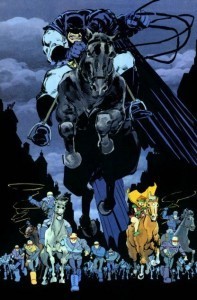 Don’t waste your life on lesser things. You were meant for something great. It might mean becoming a great steel worker, a great firefighter, a great housewife, or a great friend. It might mean being a great artist, a great plumber, a great motivator, or a great parent. Whatever it is, it is unique to you. Something no one else can do in the same way or to the same degree that you will. If, of course, you choose to do it.
Don’t waste your life on lesser things. You were meant for something great. It might mean becoming a great steel worker, a great firefighter, a great housewife, or a great friend. It might mean being a great artist, a great plumber, a great motivator, or a great parent. Whatever it is, it is unique to you. Something no one else can do in the same way or to the same degree that you will. If, of course, you choose to do it.
Find your purpose and fulfill it.
It’s waiting for you.
Find more reviews of The Dark Knight at amazon.com!
Packing Action
- Randall Allen Dunn's profile
- 56 followers



